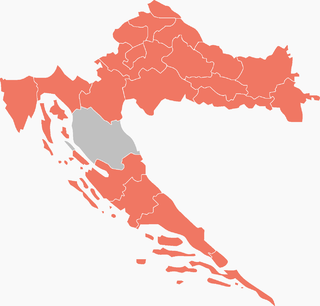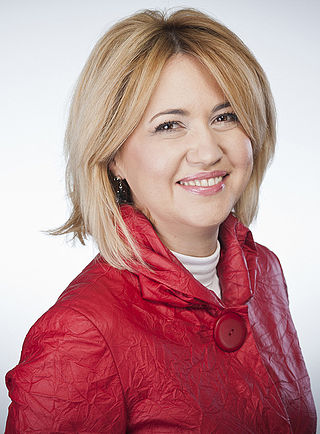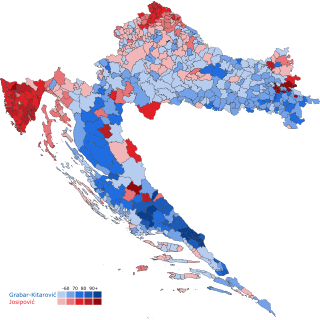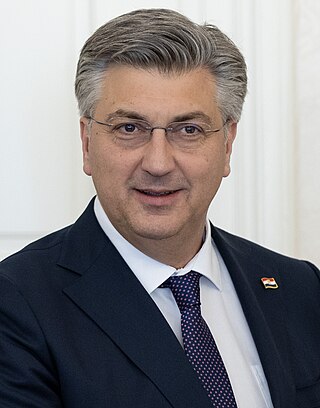
The Social Democratic Party of Croatia is a social-democratic political party in Croatia. The SDP is anti-fascist, progressive, and strongly pro-European. The SDP was formed in 1990 as the successor of the League of Communists of Croatia, the Croatian branch of the League of Communists of Yugoslavia, which had governed Croatia within the Socialist Federal Republic of Yugoslavia since World War II.

Jadranka Kosor is a Croatian politician and former journalist who served as Prime Minister of Croatia from 2009 to 2011, having taken office following the sudden resignation of her predecessor Ivo Sanader. Kosor was the first and so far only woman to become Prime Minister of Croatia since independence.

Kolinda Grabar-Kitarović is a Croatian politician and diplomat who served as President of Croatia from 2015 to 2020. She was the first woman to be elected to the office since the first multi-party elections in 1990 and independence from Yugoslavia in 1991. At 46 years of age, she also became the youngest person to assume the presidency.

Zoran Milanović is a Croatian politician serving as the president of Croatia since 2020. Prior to assuming the presidency, he was prime minister of Croatia from 2011 to 2016, as well as president of the Social Democratic Party (SDP) from 2007 to 2016.

Croatia and Russia established diplomatic relations on 25 May 1992. Croatia has an embassy in Moscow and honorary consulates in Kaliningrad, Novosibirsk, and Sochi. Russia has an embassy in Zagreb and honorary consulates in Pula and Split.

Presidential elections were held in Croatia on 27 December 2009 and 10 January 2010. Twelve candidates participated in the first round, prior to a run-off between first-round winner Ivo Josipović and runner-up Milan Bandić. In the run-off, Josipović won a landslide victory, receiving 60.3% of the vote becoming the first elected president nominated by the Social Democratic Party of Croatia (SDP). The incumbent president Stjepan Mesić, who was first elected in 2000 as the candidate of the Croatian People's Party and re-elected in 2005 as an independent, was ineligible to seek re-election to a third term due to term limits.
Željko Kerum is a Croatian entrepreneur and politician who served as Mayor of Split from 2009 to 2013. He also owned the supermarket chain Kerum until it folded in 2012.

Ivo Josipović is a Croatian academic, jurist, composer, and politician who served as President of Croatia from 2010 to 2015.

Tomislav Karamarko is a Croatian politician who served as First Deputy Prime Minister of Croatia from January to June 2016. He served in the Cabinet of Jadranka Kosor as Minister of the Interior from 2008 to 2011.

Milanka Opačić is a Croatian politician who served as a Minister of Social Welfare and Youth at centre-left Cabinet of Zoran Milanović from 2011 to 2016. She served as one of four vice-presidents of the Social Democratic Party, the main centre-left political party in the Sabor. She was first elected to Sabor in the 1992 parliamentary election, and was reelected in 2000, 2003, 2007, 2011, 2015 and 2016.

Rivers of Justice is a centre-left political alliance in Croatia. Gathered around the Social Democratic Party of Croatia (SDP), the coalition was originally formed in 2010 as the Kukuriku coalition. This somewhat facetious name meaning 'cock-a-doodle-doo', taken from a restaurant of the same name in Kastav where the coalition leaders first convened in July 2009, became well known and was eventually taken as the coalition's official name. The coalition originally consisted of four centrist and centre-left parties in the Croatian Parliament: the Social Democratic Party of Croatia (SDP), Croatian People's Party – Liberal Democrats (HNS-LD), Croatian Party of Pensioners (HSU) and Istrian Democratic Assembly (IDS). The coalition won an absolute majority of seats in the 2011 parliamentary election and successfully formed a government led by Zoran Milanović (SDP).

Mirela Holy is a Croatian academic, politician and a former leader of the centre-left Croatian Sustainable Development party (ORaH). She served as Croatia's Minister of Environment from 2011 until 2012, the first and to date only woman to hold this position.
Since its founding in 1990, elections within the Social Democratic Party of Croatia were held numerous times.
Opinion polling for the 2015 Croatian parliamentary election started immediately after the 2011 general election. Monthly party ratings are conducted by Ipsos Puls, Mediana and Promocija Plus.

Ivo Baldasar is a Croatian politician who served as Mayor of Split from 2013 until his resignation in March 2017. He was a member of the Social Democratic Party (SDP) until he was thrown out of the party in 2016. After that, he joined forces with the Bandić Milan 365 party. In 2017 he formed his own party called The Split Party.

Vlado Košić is a Croatian bishop and leader of the Roman Catholic Diocese of Sisak.

Presidential elections were held in Croatia on 28 December 2014 and 11 January 2015, the sixth such elections since independence in 1991. Only four candidates contested the elections, the lowest number since 1997. Incumbent President Ivo Josipović, who had been elected as the candidate of the Social Democratic Party in 2009–2010 but ran as an independent, was eligible to seek reelection for a second and final five-year term. As no candidate received 50% of the vote in the first round in December 2014, a run-off took place in January 2015 between the two candidates with the most votes; Josipović and Kolinda Grabar-Kitarović. Grabar-Kitarović went on to win the elections by a slim margin of 32,509 votes or 1.48%, making her Croatia's first female president.

Presidential elections were held in Croatia on 22 December 2019. Social Democratic Party nominee Zoran Milanović narrowly defeated incumbent president Kolinda Grabar-Kitarović in a second round of voting.
2014–2016 Croatian war veterans tent protest was 555 days long war veterans protest, often dubbed in Croatia as The Tenters. The protests were initially aimed against Ministry of Croatian Veterans deputy Bojan Glavašević and Minister Predrag Matić himself, however the protesters subsequently changed their demands and started demanding the resignation of centre-left Prime Minister Zoran Milanović and then President Ivo Josipović. The protests escalated in May 2015 when a group of protesters breached the riot police cordons in Zagreb Upper Town and barricaded themselves inside St. Mark Church, where they again clashed with the police. At the same time another group of protesters near the central tent blocked the traffic and brought out gas bottles on Savska street which they apparently threatened to blow if the police refused to back off from the church. After both Josipović and Milanović lost the elections in 2014 and 2015, the protests gradually calmed down and in April 2016, with the new minister taking over the Veterans Office, the tent was dismantled, formally ending the protest.

Parliamentary elections were held in Croatia on 17 April 2024 to elect the members of the 11th Sabor. Prior to the elections, the government consisted of a coalition of the Croatian Democratic Union and Independent Democratic Serb Party, with parliamentary support of five national minority MPs, two MPs from the Croatian Social Liberal Party and Croatian Demochristian Party, and one independent MP, Silvano Hrelja.
















